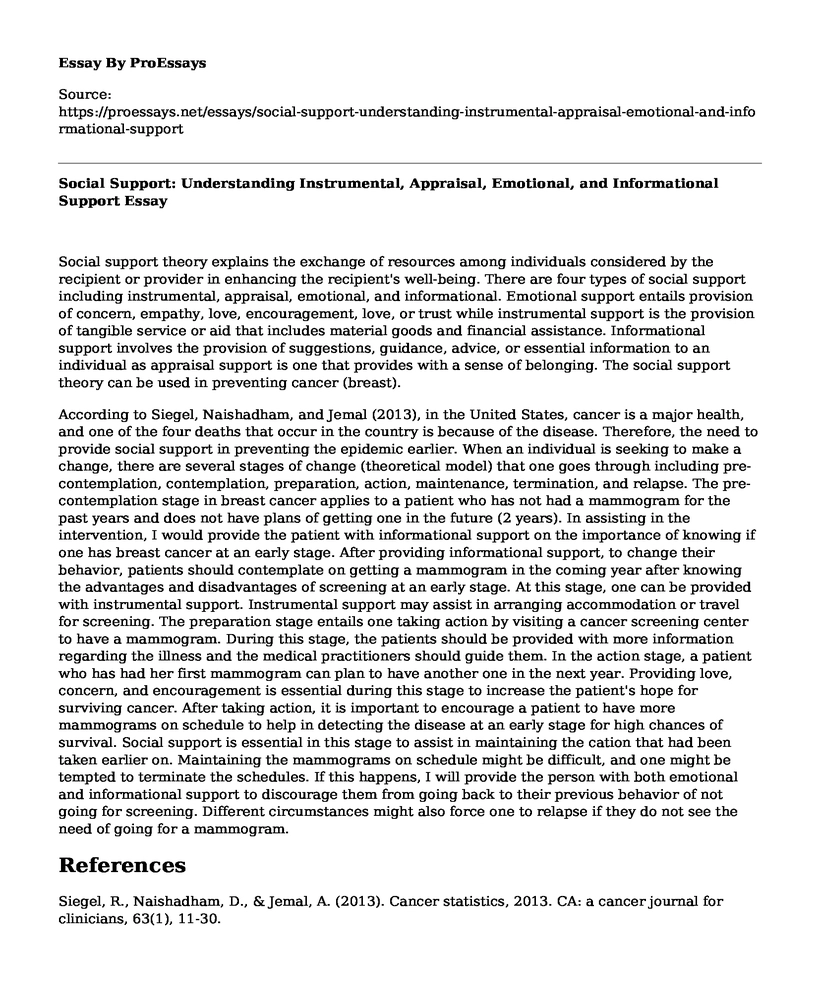Social support theory explains the exchange of resources among individuals considered by the recipient or provider in enhancing the recipient's well-being. There are four types of social support including instrumental, appraisal, emotional, and informational. Emotional support entails provision of concern, empathy, love, encouragement, love, or trust while instrumental support is the provision of tangible service or aid that includes material goods and financial assistance. Informational support involves the provision of suggestions, guidance, advice, or essential information to an individual as appraisal support is one that provides with a sense of belonging. The social support theory can be used in preventing cancer (breast).
According to Siegel, Naishadham, and Jemal (2013), in the United States, cancer is a major health, and one of the four deaths that occur in the country is because of the disease. Therefore, the need to provide social support in preventing the epidemic earlier. When an individual is seeking to make a change, there are several stages of change (theoretical model) that one goes through including pre-contemplation, contemplation, preparation, action, maintenance, termination, and relapse. The pre-contemplation stage in breast cancer applies to a patient who has not had a mammogram for the past years and does not have plans of getting one in the future (2 years). In assisting in the intervention, I would provide the patient with informational support on the importance of knowing if one has breast cancer at an early stage. After providing informational support, to change their behavior, patients should contemplate on getting a mammogram in the coming year after knowing the advantages and disadvantages of screening at an early stage. At this stage, one can be provided with instrumental support. Instrumental support may assist in arranging accommodation or travel for screening. The preparation stage entails one taking action by visiting a cancer screening center to have a mammogram. During this stage, the patients should be provided with more information regarding the illness and the medical practitioners should guide them. In the action stage, a patient who has had her first mammogram can plan to have another one in the next year. Providing love, concern, and encouragement is essential during this stage to increase the patient's hope for surviving cancer. After taking action, it is important to encourage a patient to have more mammograms on schedule to help in detecting the disease at an early stage for high chances of survival. Social support is essential in this stage to assist in maintaining the cation that had been taken earlier on. Maintaining the mammograms on schedule might be difficult, and one might be tempted to terminate the schedules. If this happens, I will provide the person with both emotional and informational support to discourage them from going back to their previous behavior of not going for screening. Different circumstances might also force one to relapse if they do not see the need of going for a mammogram.
References
Siegel, R., Naishadham, D., & Jemal, A. (2013). Cancer statistics, 2013. CA: a cancer journal for clinicians, 63(1), 11-30.
Responding to a student's post
I enjoyed reading your post since you articulated your points in a way that one can easily understand. Indeed, smoking is one of the leading causes of deaths globally. Do you think other models can be used in explaining the social support theory apart from the transtheoretical model? People suffering from smoke addiction need all four types of support for them to cope with the situation efficiently. However, do you think some people usually get tired when providing these supports? I understand that these people should be treated with care. But at times, one can feel like it is just a waste of resources and time. Relapsing is common for most people addicted to smoking and alcohol. Therefore, it worth noting that they should be given appraisal support in understanding that even after relapsing one can start over. Some people do relapse even three times before quitting fully, and that is the reason, I understand your points on the issue. I also liked the example you used for someone who has quit smoking but goes back to his former behavior. It clearly shows that you can apply the theory in real-world situations. Furthermore, it is important for us as a society not to tire from assisting individuals with addiction. The several types of social support given to these people might help them relieve stress and quit smoking at the end. Even though you did a great job, you should have applied the other stages in your post to bring out the social theory and smoking in a detailed and precise manner.
Cite this page
Social Support: Understanding Instrumental, Appraisal, Emotional, and Informational Support. (2022, Dec 29). Retrieved from https://proessays.net/essays/social-support-understanding-instrumental-appraisal-emotional-and-informational-support
If you are the original author of this essay and no longer wish to have it published on the ProEssays website, please click below to request its removal:
- Ethical Issues: Non-Monogamy Relationship Essay Example
- The Situational Analysis and the Strategic Communications Plan Paper Example
- Annotated Bibliography on Depression of College Students
- Same-Sex Marriage: A History of Support & Opposition - Research Paper
- Trust: A Gender Difference in Return and Behavior - Essay Sample
- Essay Sample on Explaining Growth and Development: Bandura's Social Cognitive Theory
- People with IDD: Equal Rights to Decision Making and Support for Health Care - Essay Example







